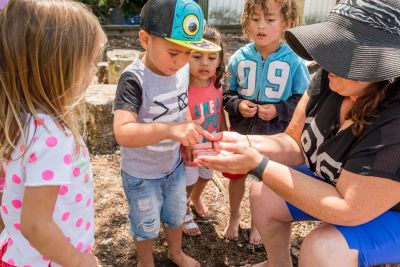The Kindergarten Movement
Public kindergartens provide affordable, high quality, inclusive teaching that reflects the diverse communities we serve.

The Kindergarten Movement
In New Zealand, kindergartens emerged in the late 19th century. First attached to schools and later as standalone "free kindergartens" serving communities in need, kindergartens brought Friedrich Froebel's pioneering ideas to Aotearoa.
Originating in Germany in 1837, Froebel's concept of "kindergarten" focused on creating nurturing environments where children could learn through play, self-activity, and interaction with nature. This view of early childhood education, emphasising love, creativity, and the education of women as teachers, spread globally.
The Dunedin Free Kindergarten Association, founded in 1889, became the first enduring association, establishing a legacy of charitable, community-based early education. Kindergartens were initially supported by private donations and voluntary efforts until government funding began in 1904, growing significantly by 1948 to support a national movement.
The role of kindergartens in ECE today
Today, Aotearoa's kindergartens remain committed to their founding principles: fostering inclusive, equitable, and high-quality early education for tamariki. Rooted in Te Whāriki, the national curriculum, they uphold the ideals of community, holistic development, and public service, continuing to adapt and innovate to meet societal and educational needs. This movement is a cornerstone of New Zealand's social history and an enduring example of community-driven education.
Public kindergartens in Aotearoa play a vital role as not-for-profit early childhood education providers. Grounded in their communities, they offer accessible, high-quality education that prioritises the well-being and development of tamariki. As publicly funded services, kindergartens uphold a commitment to equity, inclusivity, and collaboration, ensuring that every child has the opportunity to thrive in a nurturing and holistic learning environment.
Why Kindergartens Aotearoa was established
Kindergartens Aotearoa was formed to strengthen and grow the kindergarten movement in Aotearoa New Zealand by uniting regional kindergarten associations into a collective force. Our purpose is to ensure kindergartens remain a public, community-based, not-for-profit service that provides high-quality early childhood education accessible to all tamariki and their whānau.
As a collective, we aim to address challenges such as declining enrolments, changing government policies, and increasing demands on families and communities. By sharing resources, expertise, and advocacy efforts, Kindergartens Aotearoa works to protect the unique values of kindergartens and maintain professional teaching standards. We want to ensure the movement remains sustainable, innovative, and impactful for future generations. Upholding Te Tiriti o Waitangi and fostering community partnerships are central to our mission of delivering education that reflects and respects the diverse identities of Aotearoa’s people.